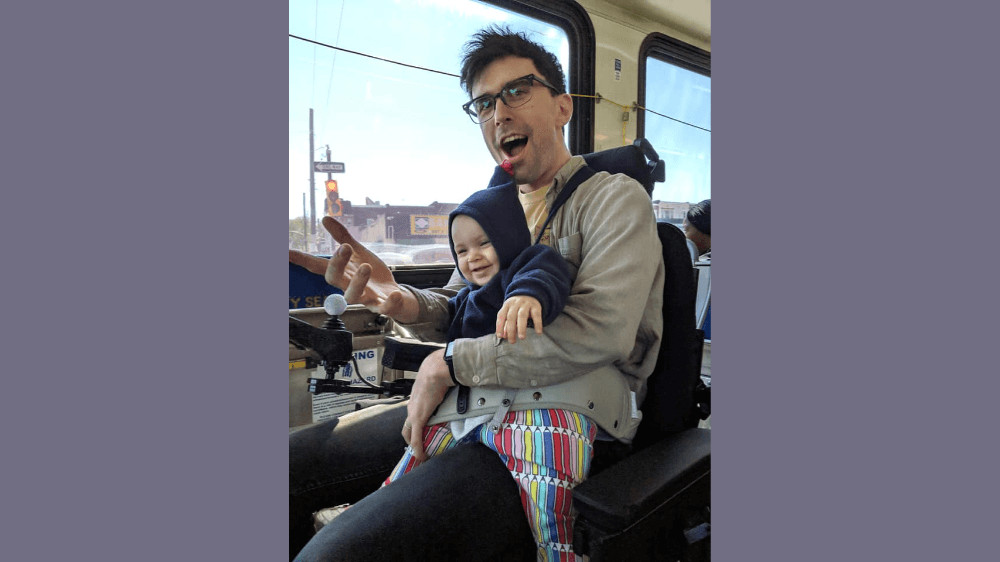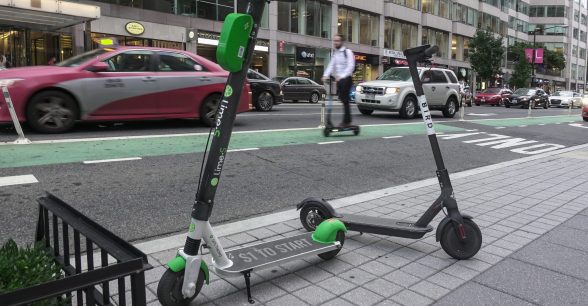Cripping the Folks: A Disabled Father’s Reflections and Advice
Disability fell on me like a piano from a great height. I was first diagnosed with a rare, genetic, progressive neuromuscular disorder at 16. I had no friends or family who had a disability—or at least no one who identified as having a disability. I say identified because I found out around that time that my dad has severe dyslexia, but it didn’t occur to me until writing this that he could very well have identified as disabled. But we had never talked about it in those terms.
I don’t mean to imply that there was anything willful about him not identifying. I just believe it exemplifies the social stigma around disability; he didn’t think he had a disability because to have a disability was to be considered outside of the “normal” social lanes we go down—an essential “Otherness” that runs deeper than other demographic differences, that is commonly identified with weakness, mortality, being subhuman.
The “severity” of my newly diagnosed disability, as well as the fact that it had obvious physical symptoms, made it impossible to escape by not identifying as disabled. I was lucky enough to have parents who loved me and wanted the best for me, but this love initially took the form of fear, pity, and despair at the “Otherness” that disability had forced upon their child. They envisioned a life for me without power chairs or portable urinals, and my diagnosis disrupted that. Thinking about this now, it sounds more superficial than I want it to sound. My parents wanted me to have a long and easy life, which is far from indefensible.
My family is Irish Catholic, so shame and guilt are our bread and butter. And they fit in here well, as my mom and dad put the “fault” on themselves for “doing this to me” through recessive traits in their own DNA. At the time, they were scared just like I was and focused on the loss that I was experiencing. My parents blamed themselves for my manifest descent into loss of control and feeling my in body, summed up in the social label of disability.
Now that I’m a parent, I understand their reaction. As parents reading this are probably well aware, not many things in life shake you to your existential core as much as having kids. I am blindsided constantly by the deep emotions that bubble up in me when I see my sixteen-month-old daughter’s face and how she encounters the world. I literally started sobbing a few hours ago over the cuteness when she blew me a kiss. I completely recognize how the reflexive and unmediated things I do or say around her (even if they come from a place of total love) could be detrimental to her psychological development in the long run.
One such moment for me as a teenager happened when my parents told me that I should not tell my 90-year-old grandfather about my diagnosis because they wanted him to die without knowing that I have a disability. Looking back on it now, I see that it was probably because they knew that he would not be able to fully understand my diagnosis. The Beatles were too modern for him—no doubt he had antiquated ideas of what disability was. But at the time, it reinforced the feelings that disability was something to be ashamed of. Not only did I think that it cemented my place in social “Otherness,” but it made me feel like I should try to hide that part of who I am. And because my disability is progressive, I could mostly “pass” as not having one for a while. So I did that until I couldn’t anymore.
No one experience changed things for me; it was a combination of supports that were essential to me embracing my disability. As soon as we got beyond fear and guilt, my parents became integral to my new support system. Through everything, my family did help me process my feelings by talking and crying together, and they continue to make the modifications that allow me to lead an independent life. Making friends inside and outside of the disability arena gave me a sense that the two-dimensional “disability=Otherness” narrative is flimsy. If you show people how you want to be treated, they generally follow. And meeting strong, smart, and determined disability activists like those at ADAPT gave me people to look up to. With these pillars set up, just living life day-to-day is proof that there is nothing inherently wrong with me.
Looking back on everything, here is what I would tell parents of disabled kids: teach your children to be proud of everything they are and support the hell out of them as they grow. Disability is a difference but not inherently wrong or morally negative. Spend some time thinking about this and model that thinking for your kiddos. Teach them that disability is not only an essential part of the human experience but also has a vibrant history filled with badass heroes and civil rights victories.
Be sure to encourage your kids to engage with other people in the disability community who are leading fulfilling lives. Take them to events that are focused on adaptation (of sports, technology, etc.) rather than fundraisers looking for a cure (or other ways to make them more “normal”). I do think it’s important to not make kids do anything they don’t want to do, but leave this door open for them to go through themselves. Drive them to meetings or research events to tell them about. Find ways to support their growth.
Supporting your kids means listening, understanding, and communicating about the best ways to assist them—be it emotional processing or physical support. For instance, my own feeling is that you can ask me if I want help doing something, but don’t help if I say no. Communication is key to fostering a relationship of mutual respect.
And finally, tell your kid that you love them and that they are deserving of love and acceptance to the same degree as anyone else. Everyone has a negative voice in their head that tells them they are not worthy or not good enough. An inaccessible landscape (i.e., stairs without a ramp or an uncaptioned video) can be internalized as society further rejecting disability. Help counterbalance this, especially with younger kids. Help them see that disability is only a part of who they are, and recognize the absurdity of the narrative that says that disability is something that shows weakness. I didn’t confront these things until I could no longer “pass” as non-disabled and I had to face them whether I wanted to or not, but you can start from the beginning with your kids. They can learn to be strong by subverting the ableist narrative of wretchedness, fear, and shame in disability, and building a new one that starts with acceptance. Their evolved understanding starts with yours.
About Rooted In Rights
Rooted in Rights exists to amplify the perspectives of the disability community. Blog posts and storyteller videos that we publish and content we re-share on social media do not necessarily reflect the opinions or values of Rooted in Rights nor indicate an endorsement of a program or service by Rooted in Rights. We respect and aim to reflect the diversity of opinions and experiences of the disability community. Rooted in Rights seeks to highlight discussions, not direct them. Learn more about Rooted In Rights




I love you for taking time to write this Liam! It weaved through emotions and memories I’ve experienced with my Twins. Write as often as you can. We are deserving of your perspective and glass half full mentality. ❤️❤️❤️❤️❤️❤️❤️❤️❤️❤️❤️❤️❤️❤️🌷T-Bah
Wonderful article, Liam. So proud of you and your wonderful writing style!
This is a well-wriiten essaye
Service for parents. hat is backed up by my own experience with a goddaughter with Cerebral palsy. i learned so much from her that I hadn’t access to before, and hope that your writing might perform the service for parents. Keep writing, Liam!
It is so important for you to share your perspective. Thanks!
Beautiful insight, Liam..so well said. It is so difficult for a parent to take a step back and let their children with disabilities figure things out on their own and solve their own challenges. But it is so necessary. Keep up the fight!!
Thank you Liam. You’ve been an inspiring leader to me in many ways, and now you are as a parent.
As someone who has been blessed to witness your journey from both afar and close-up, I am so appreciative of the insights you’ve shared in this essay. I was diagnosed with dyslexia in 1970 and I cannot remember ever being labeled as having a disability. After reading this piece, I now wonder why? Could it be they knew of the stigma attached to such a diagnosis?
You are a true voice not just for for the disabled, but for all humanity. We are all better people for having you in our lives.
Beautiful, insightful and empowering! Thank you, Liam.
Liam — here’s to sidewalks with cutouts free of potholes, stainless steel straws and a clear-eyed vision of the world from four feet. Keep writing! We love you!!
Cousin it’s not weakness its strength to live your best life. Its exactly what I want for Cameron.